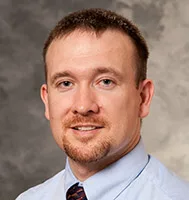Society of Neurological Surgeons honors Robert Dempsey
Robert Dempsey, MD, chairman of neurosurgery in the University of Wisconsin School of Medicine and Public Health, is the third recipient of the national society’s Medical Student Teaching Award.
A five-year, $3 million grant from the National Cancer Institute will support UW Carbone Cancer Center physician-researcher Dusty Deming, MD, and colleagues in their pursuit of more effective treatments for colorectal-cancer patients.
With the funding, researchers at the McArdle Laboratory for Cancer Research and UW Carbone will grow colon cancer cells from patient-derived tissue to help predict how an individual patient’s cancer will respond to various treatments. By growing tissues from individual patients in three-dimensional, or organotypic, cultures, the researchers will be able to better simulate a given patient’s cancer in a laboratory setting.
“The organotypic cultures allow us to take a patient tissue sample from the clinic, test the treatments that are being considered for the patients, and use the lab results to find the best therapy for those patients,” Deming said. “Specifically, we are looking at whether we can predict the response to chemotherapy and radiation for patients with colorectal cancers.”

The study will use optical imaging techniques developed by Melissa Skala, PhD, a co-investigator at the Morgridge Institute for Research, to monitor the evolution of the organotypic cultures over time. Through this technology, the researchers will investigate how the genetics of individual tumors affect their response to treatments.
“Our long-term goal is to be able to tell a patient who comes into a clinic, ‘We have taken your tissue, tested it in the lab, and based on those results we can tell you this is what your treatment strategy should be,’” Deming said.
Deming and Skala previously collaborated on a similar approach using organotypic cultures to study personalized therapies for pancreatic cancer. For this new study, they will also work with other UW Carbone members, including gastrointestinal oncologist Nataliya Uboha, MD, PhD, colorectal surgeons Evie Carchman, MD, and Elise Lawson, MD, radiation oncologists Mike Bassetti, MD, and Randy Kimple, MD, PhD, radiologist David Kim, MD, statistician Jens Eickhoff, PhD, and pathologist Kristina Matkowskyj, MD, PhD. The preliminary data making this grant possible were funded by the Funk Out Cancer Event, the Cathy Wingert Colorectal Cancer Research Fund, and the Carbone Young Investigator Award.
“Under the current standard of care, we don’t have a great idea of who is going to benefit from certain treatments and who is not,” Deming said. “Having a way of predicting who will respond to a given treatment will be critical in helping eliminate side effects and toxicities for patients who wouldn’t benefit from those therapies.”